Daily Vocabulary Words: List of Daily Used Words
Hi there. Welcome to this special section @ Wordpandit.
Our endeavour here is straightforward: highlighting important daily vocabulary words, you would encounter in The Hindu. This is your repository of commonly used words; essentially, we are posting a list of daily used words. Hence, this has significant practical application as it teaches you words that are commonly used in a leading publication such as The Hindu.
Visit the website daily to learn words from The Hindu.
WORD-1: Sticking
CONTEXT: The Khelo India ecosystem is a testament to the government’s success in sticking to the right causes. For example, the creation and upgradation of sports infrastructure was a priority. More than 300 sports infrastructure projects have been approved in 34 States/UT at a cost of more than ₹3,000 crore.
SOURCE: The Hindu
EXPLANATORY PARAGRAPH: Think about when you put a sticker on your notebook, and it stays there because the back is sticky. “Sticking” is just like that. It means something is staying attached to something else, like when you press a sticker onto something and it doesn’t come off.
MEANING: Adhering or attaching to a surface, typically not moving or coming loose (verb).
PRONUNCIATION: STIK-ing
SYNONYMS: adhering, clinging, attaching, bonding, fastening
USAGE EXAMPLE:
1. The label was sticking to the bottle even after it got wet.
2. She had trouble sticking the poster to the wall because it kept falling down.
3. Mud was sticking to his shoes after the hike.
4. The gum was sticking to the bottom of the table.
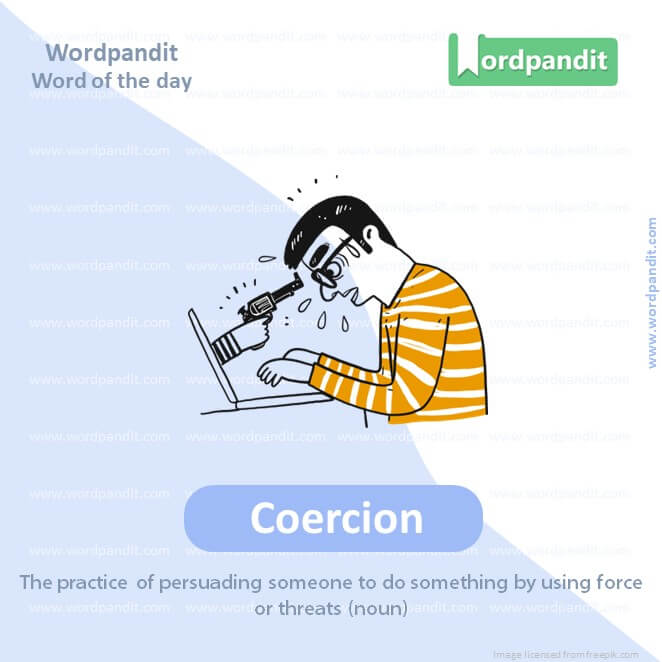
WORD-2: Coercion
CONTEXT: The idea of an Opposition-mukt (free) Gujarat means that those who cannot be defeated electorally must be co-opted into the party either with incentives or through coercion or a mix of both.
SOURCE: The Hindu
EXPLANATORY PARAGRAPH: Imagine if someone tried to make you give them your lunch by threatening to not be your friend anymore. That’s called “coercion.” It means forcing someone to do something they don’t want to by threatening them or making them feel scared.
MEANING: The practice of persuading someone to do something by using force or threats (noun).
PRONUNCIATION: koh-UR-shun
SYNONYMS: compulsion, force, pressure, intimidation, duress
USAGE EXAMPLE:
1. The court ruled that the confession was obtained through coercion.
2. She felt a sense of coercion to agree with the group’s decision.
3. Coercion in any form is unacceptable in a democratic society.
4. The policy was criticized for being a form of economic coercion.
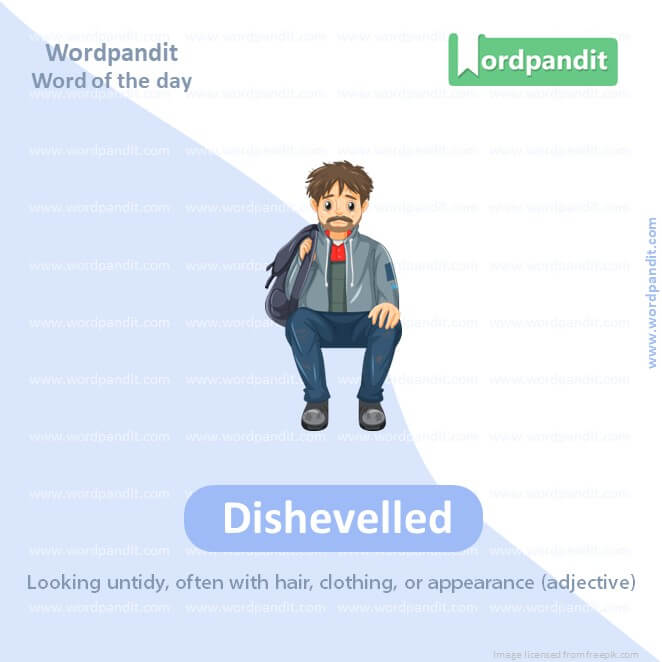
WORD-3: Dishevelled
CONTEXT: He might look like an accountant accidentally woken up by an alarm beeping too early, hair dishevelled and on the point of complaining.
SOURCE: The Hindu
EXPLANATORY PARAGRAPH: Imagine playing outside all day, running around, and when you come inside, your hair is all messy and your clothes are a bit untidy. That’s being “dishevelled.” It means looking all rumpled and not neat, like after a long day of fun and games.
MEANING: Looking untidy, often with hair, clothing, or appearance (adjective).
PRONUNCIATION: di-SHEV-uhld
SYNONYMS: unkempt, messy, rumpled, tousled, bedraggled
USAGE EXAMPLE:
1. He arrived home looking dishevelled after the long journey.
2. Her hair was dishevelled by the strong winds.
3. The puppy looked rather dishevelled after playing in the mud.
4. He tried to fix his dishevelled appearance before the meeting.
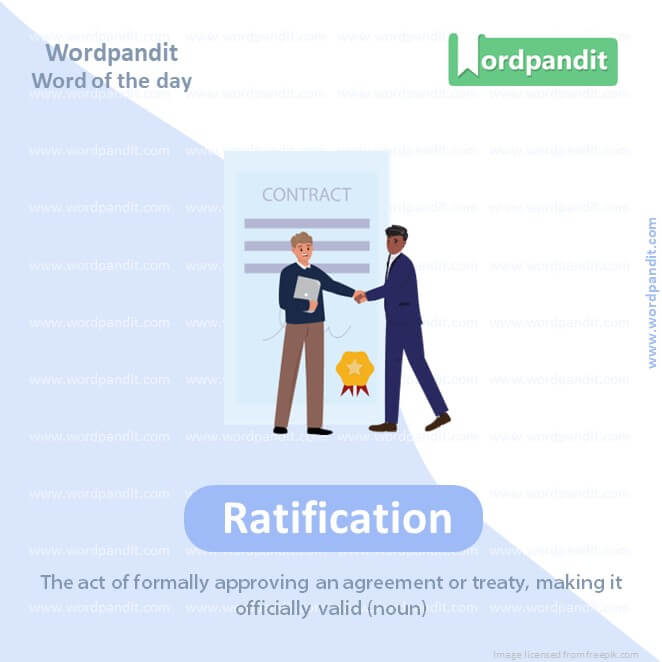
WORD-4: Ratification
CONTEXT: India’s discovery of new stars (Dhruv Jurel, Sarfaraz Khan, Akash Deep) and ratification of the potential of a recent one (Yashasvi Jaiswal) have been touted as the gains of the series, which they are.
SOURCE: The Hindu
EXPLANATORY PARAGRAPH: Imagine the whole class votes on a rule that says you can have extra recess time once a week, and then the teacher says it’s okay and makes it official. That’s called “ratification.” It means when something, like a rule or agreement, is officially approved by everyone who needs to say yes.
MEANING: The act of formally approving an agreement or treaty, making it officially valid (noun).
PRONUNCIATION: rat-ih-fi-KAY-shun
SYNONYMS: approval, confirmation, endorsement, sanction, validation
USAGE EXAMPLE:
1. The ratification of the new law was celebrated by many.
2. The treaty’s ratification required the signatures of all member states.
3. After months of debate, the contract finally received ratification.
4. The amendment awaits ratification by the senate.
WORD-5: Tortuous
CONTEXT: I discuss with the parents of our future daughter-in-law such issues as Britain’s post-Brexit trade relations and the tortuous bowling action of India’s spin bowler Kuldeep Yadav…”
SOURCE: The Hindu
EXPLANATORY PARAGRAPH: Imagine a winding path in a park that goes left and right, up and down, making you take a long time to get to the end. That’s “tortuous.” It means something is very twisty and turns a lot, making it not straight or direct.
MEANING: Full of twists, turns, or bends; not straightforward (adjective).
PRONUNCIATION: TOR-choo-us
SYNONYMS: winding, twisting, convoluted, serpentine, meandering
USAGE EXAMPLE:
1. The tortuous mountain road was challenging for drivers.
2. He gave a tortuous explanation that confused everyone.
3. The river followed a tortuous path through the valley.
4. The plot of the novel was tortuous and hard to follow.
WORD-6: Blunted
CONTEXT: The scandal had tarnished the Socialists, but the party that made gains out of it was the anti-establishment Chega whose rise blunted the edge the Social Democrats had had in the early stage of the campaign.
SOURCE: The Hindu
EXPLANATORY PARAGRAPH: Imagine using a pencil so much that it starts to write more thickly and not as sharply. That’s because it’s “blunted.” It means something is not as sharp or effective as before, like when your pencil needs sharpening to write clearly again.
MEANING: Made less sharp, effective, or forceful (adjective).
PRONUNCIATION: BLUN-ted
SYNONYMS: dulled, numbed, weakened, diminished, muted
USAGE EXAMPLE:
1. The scissors became blunted after cutting through so many thick papers.
2. His criticism was blunted by her sincere apology.
3. The impact of the message was blunted by its confusing delivery.
4. Repeated failures had blunted his enthusiasm for the project.
WORD-7: Seamlessly
CONTEXT: Game progress and achievements will effortlessly sync across devices, enabling players to resume their gameplay seamlessly from any signed-in device.
SOURCE: The Hindu
EXPLANATORY PARAGRAPH: Imagine a puzzle that fits together so perfectly, you can’t even see where one piece ends and another begins. That’s being “seamlessly.” It means things are combined in such a smooth way that you can’t tell they were ever apart, like when everything in a dance goes perfectly together.
MEANING: In a manner that combines elements so well that there are no seams or obvious joins (adverb).
PRONUNCIATION: SEEM-lus-lee
SYNONYMS: smoothly, flawlessly, perfectly, continuously, effortlessly
USAGE EXAMPLE:
1. The new software integrates seamlessly with the existing system.
2. The event transitioned seamlessly from one performance to the next.
3. The story moves seamlessly between the past and
present.
4. They worked seamlessly together to complete the project on time.
WORD-8: Asserting
CONTEXT: Mr. Gadkari on Tuesday dismissed the suggestion, asserting that the Shiv Sena (UBT) leader need not worry about BJP leaders.
SOURCE: The Hindu
EXPLANATORY PARAGRAPH: Imagine you’re telling your friends with confidence that your favorite color is blue and not green. That’s “asserting.” It means you’re saying something very firmly because you believe it’s true, like when you stand up for what you think or feel.
MEANING: Declaring or stating something confidently and forcefully (verb).
PRONUNCIATION: uh-SURT-ing
SYNONYMS: declaring, stating, proclaiming, affirming, insisting
USAGE EXAMPLE:
1. She was asserting her rights as a consumer.
2. He kept asserting that he was innocent.
3. The scientist was asserting a controversial theory.
4. They are asserting their independence from the parent company.
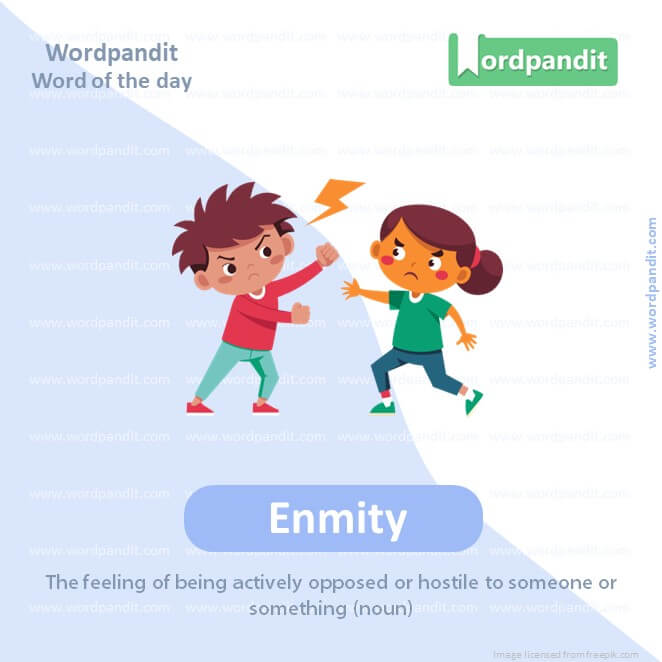
WORD-9: Enmity
CONTEXT: There is the BJP which is creating enmity between religions and wants to change the Constitution, and on the other hand there is the INDIA bloc which is an alliance of patriots,” he said.
SOURCE: The Hindu
EXPLANATORY PARAGRAPH: Imagine two characters in a story who are always trying to outdo each other and never get along, like superheroes and villains. That feeling of not liking each other is called “enmity.” It means a strong feeling of being opposed or hostile to someone or something.
MEANING: The feeling of being actively opposed or hostile to someone or something (noun).
PRONUNCIATION: EN-mih-tee
SYNONYMS: hostility, animosity, antagonism, hatred, ill will
USAGE EXAMPLE:
1. The long-standing enmity between the two families was well-known.
2. He felt no enmity towards his rival, despite their competition.
3. The enmity between the two nations led to years of conflict.
4. Their enmity stemmed from a misunderstanding years ago.
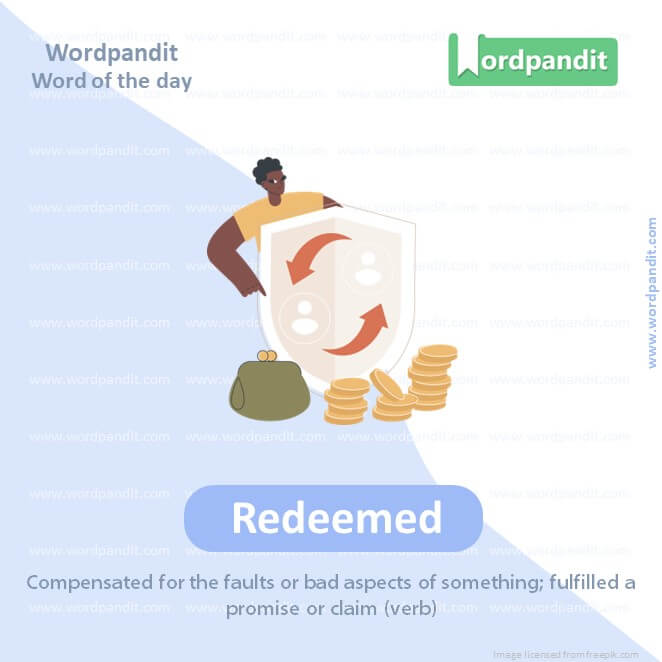
WORD-10: Redeemed
CONTEXT: From April 1, 2019 to April 11 the same month, 3,346 bonds were purchased and 1,609 were redeemed by parties.
SOURCE: The Hindu
EXPLANATORY PARAGRAPH: Imagine you have a coupon for a free ice cream, and when you go to the store, you give them the coupon to get your ice cream. That’s like “redeeming” the coupon. It means to turn something in and get something else because of it, like exchanging a coupon for a treat, or making up for something wrong you did by doing something good.
MEANING: Compensated for the faults or bad aspects of something; fulfilled a promise or claim (verb).
PRONUNCIATION: reh-DEEMD
SYNONYMS: saved, vindicated, restored, exchanged, made amends
USAGE EXAMPLE:
1. He redeemed himself in their eyes by apologizing and changing his behavior.
2. The coupon can be redeemed at any of the store’s locations.
3. She redeemed her pledge by donating the promised amount to charity.
4. The team redeemed their loss by winning the next game convincingly.
Vocabulary Difficult Words
In our journey of language learning, an encounter with ‘vocabulary difficult words’ is inevitable. These seemingly intimidating terms can often seem like stumbling blocks. However, they also offer a unique chance to deepen our understanding and competence in the language. With a strategic approach, learning ‘vocabulary difficult words’ can become less daunting and more of an empowering undertaking.
To befriend ‘vocabulary difficult words’, comprehension is key. Familiarize yourself with the meaning, usage, and context of these words. Utilize different resources such as books, documentaries, online articles, and digital content. This contextual exposure can ease the process of understanding ‘vocabulary difficult words’.
Challenging as they may seem, ‘vocabulary difficult words’ can be tamed with appropriate memory tactics. Use of flashcards or digital language learning apps that support active recall and spaced repetition can be effective. To foster deeper connections with ‘vocabulary difficult words’, employ mnemonic techniques. This cognitive strategy, involving association of new information to known concepts or stories, aids in better retention and recall.
Another essential in mastering ‘vocabulary difficult words’ is practice. Be it in conversations, written communications, or social media interactions, endeavor to incorporate these words. Practice not only reinforces your knowledge but also enhances your confidence in using these words.
In conclusion, navigating the terrain of ‘vocabulary difficult words’ involves a confluence of comprehension, memory tactics, and active practice. These strategies, interwoven, help transform intimidating words into familiar friends. By conquering ‘vocabulary difficult words’, you not only augment your vocabulary but also elevate your language skills. Remember, every challenging word unlocked is yet another ornament in your linguistic archive. So, delve deep into the ‘vocabulary difficult words’, and uncover the treasures they hold.











